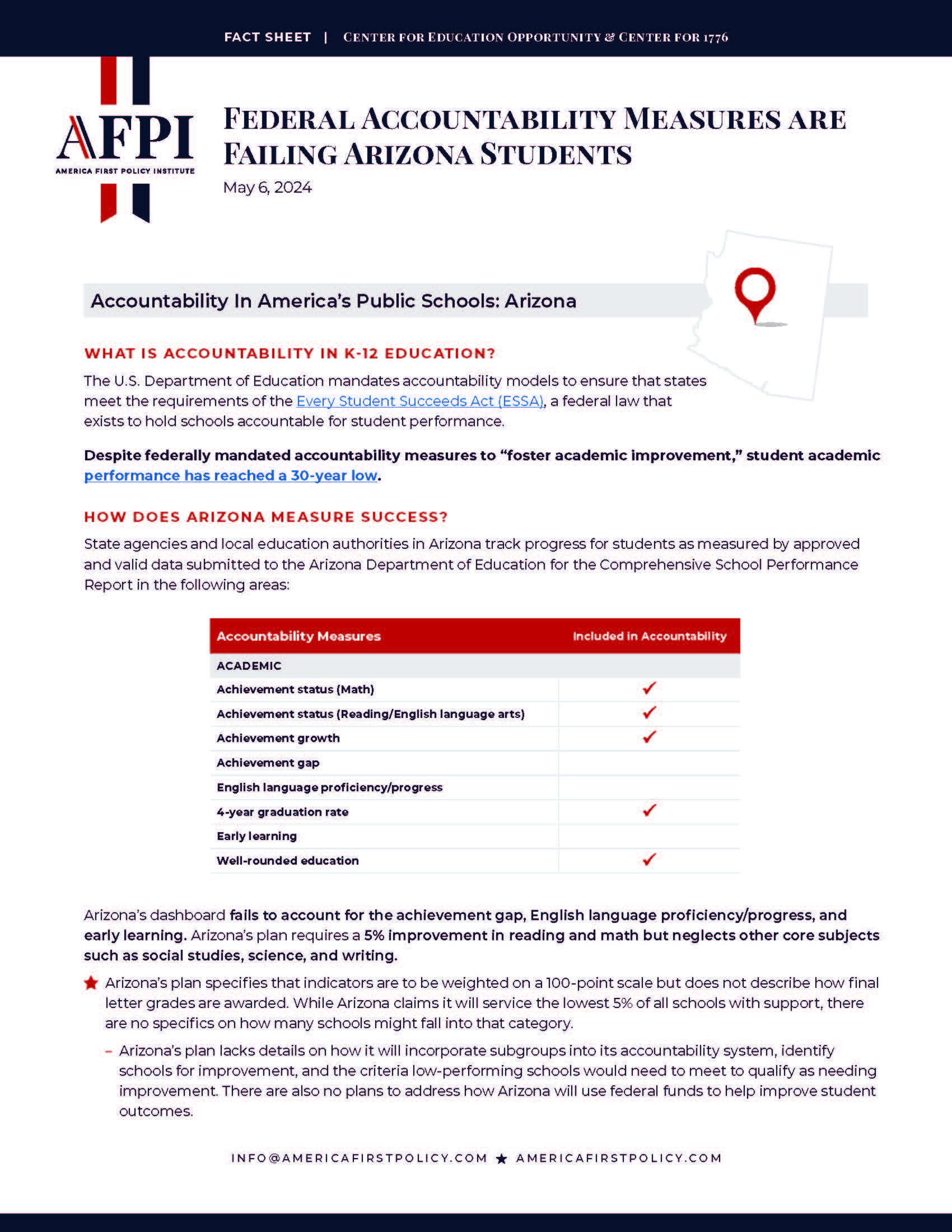Federal Accountability Measures are Failing Arizona Students
Accountability In America’s Public Schools: Arizona
WHAT IS ACCOUNTABILITY IN K-12 EDUCATION?
The U.S. Department of Education mandates accountability models to ensure that states meet the requirements of the Every Student Succeeds Act (ESSA), a federal law that exists to hold schools accountable for student performance.
Despite federally mandated accountability measures to “foster academic improvement,” student academic performance has reached a 30-year low.
HOW DOES ARIZONA MEASURE SUCCESS?
State agencies and local education authorities in Arizona track progress for students as measured by approved and valid data submitted to the Arizona Department of Education for the Comprehensive School Performance Report in the following areas:
Accountability Measures | Included in Accountability |
ACADEMIC | |
Achievement status (Math) | X |
| Achievement status (Reading/English language arts) | X |
| Achievement growth | X |
| Achievement gap | |
| English language proficiency/progress | |
| 4-year graduation rate | X |
| Early learning | |
| Well-rounded education | X |
Arizona’s dashboard fails to account for the achievement gap, English language proficiency/progress, and early learning. Arizona’s plan requires a 5% improvement in reading and math but neglects other core subjects such as social studies, science, and writing.
- Arizona’s plan specifies that indicators are to be weighted on a 100-point scale but does not describe how final letter grades are awarded. While Arizona claims it will service the lowest 5% of all schools with support, there are no specifics on how many schools might fall into that category.
- Arizona’s plan lacks details on how it will incorporate subgroups into its accountability system, identify schools for improvement, and the criteria low-performing schools would need to meet to qualify as needing improvement. There are also no plans to address how Arizona will use federal funds to help improve student outcomes.
THE NATIONAL ASSESSMENT OF EDUCATIONAL PROGRESS (NAEP), THE LARGEST NATIONAL ASSESSMENT, IS THE GOLD STANDARD FOR REPORTING OUR NATION’S EDUCATIONAL PROGRESS. WHAT DO THE LATEST NAEP RATINGS SHOW ABOUT THE EFFECTIVENESS OF ARIZONA’S ESSA PLAN?
- In 2022, according to the National Assessment of Education Progress (NAEP) in Arizona:
- The reading level of 4th grade students who performed at or above the NAEP Proficient in was only 30%.
- Black 4th grade students had an average reading score that was 24 points lower than that for White students.
- Hispanic 4th grade students had an average reading score that was 24 points lower than that for White students.
- Low-income 4th grade students had an average reading score that was 30 points lower than that for students from middle and high income families.
RESTORING EXCELLENT EDUCATION IN ARIZONA: TWO VITAL ACTIONS ARE NEEDED: HEIGHTENED TRANSPARENCY AND SHARPENED ACCOUNTABILITY.
- Congress and states must reexamine their enforcement of federal accountability mandates for monitoring student performance, providing crucial data to assess the damage and guide effective interventions.
- State assessment systems must modernize, and tests should reflect current curricula and deliver timely, actionable data regarding student progress and school performance to educators and parents.
- Accountability measures should be designed and implemented at the state level. A one-size-fits-all federal accountability model is counterproductive.
- To promote accountability and increase transparency, Arizona should:
- Increase parental involvement by upholding federal laws that ensure parents the right to observe the activities being performed in class and have access to any survey materials about their children (20 U.S.C. § 6318; 20 U.S.C § 1232h).
- Train elected school board members to review curriculum and ensure that students have access to evidence-based curricula that have a positive effect on student outcomes over time.
- Install video cameras in classrooms to track student progress, monitor curriculum implementation, and increase safety.
- Abolish teacher tenure in K–12 education, which currently does not require proof or performance metrics, leading to lower rates of teacher performance.
